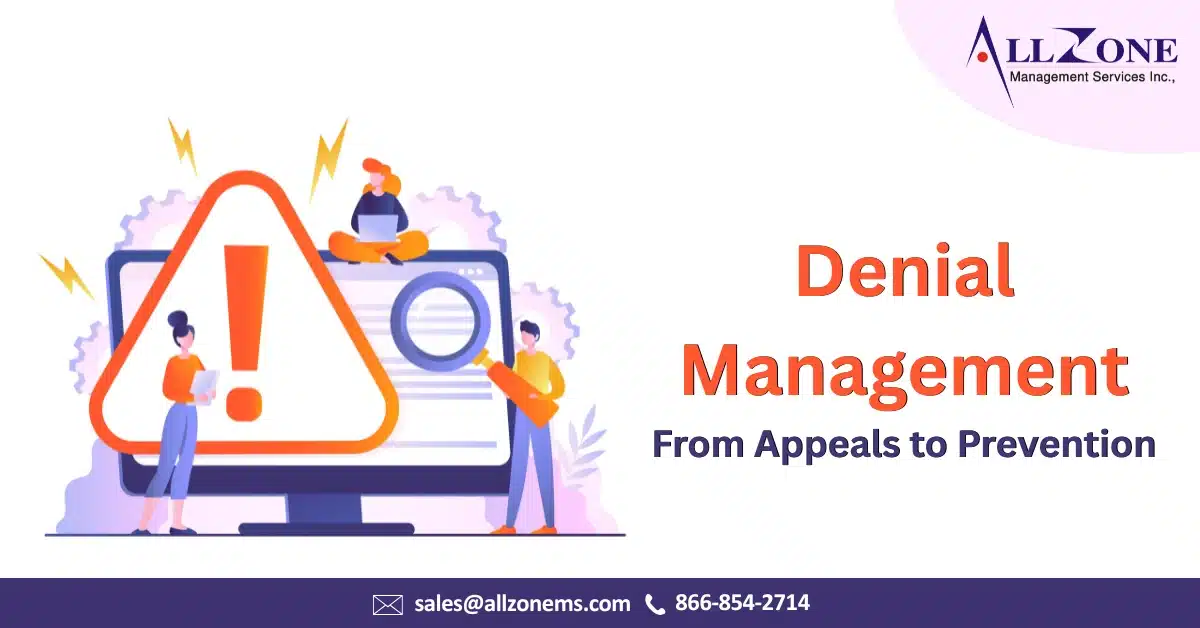Denials have always been a challenge for healthcare providers, but in 2025 they’ve reached unprecedented levels of financial and operational impact. Studies show that denial rates now average 11.8% of all claims, with some providers reporting initial denial rates as high as 20%.
For revenue cycle management (RCM) leaders, this isn’t just a numbers problem—it’s a financial and compliance challenge that can make or break organizational sustainability.
Commercial payers have become more aggressive with algorithms, AI-driven audits, and clinical validation reviews, extending far beyond technical coding errors. Billions of dollars are now tied up in appeals, write-offs, and delayed payments, forcing providers to rethink their denial management strategies.
So, what does denial management in 2025 look like—and how can providers shift from reactive appeals to proactive prevention? Let’s break it down.
The Rising Cost of Claim Denials
Claim denials aren’t new, but their cost burden has escalated. In 2022, the healthcare industry spent nearly $19.7 billion on appeals, while write-offs accounted for almost 3% of all claims.
Each appeal requires:
- Highly trained staff
- Detailed medical record documentation
- Extensive payer follow-up
- Weeks or months of administrative effort
Even when denials are overturned, providers lose time, productivity, and resources. In short, the traditional reliance on appeals is no longer financially sustainable.
Why Reactive Appeals Are No Longer Sustainable
Relying solely on appeals means fighting the same battle repeatedly. Denial reasons—whether related to coding, medical necessity, or prior authorization—are rarely addressed at the root.
This creates a vicious cycle:
- Claim is denied
- Staff appeals the denial
- Resources are consumed
- Claim is overturned (or written off)
- The same error happens again
For many healthcare organizations, appeals have become an exercise in futility, draining more money than they recover. That’s why 2025 is ushering in a paradigm shift: from appeals to prevention.
Denial Trends in 2025: What Providers Are Facing
Denial drivers today are more complex than ever. Payers are using artificial intelligence (AI), predictive modeling, and advanced analytics to flag claims before payments are even released.
Key Denial Trends Include:
- Diagnosis clusters and unspecified codes often flagged for review.
- Utilization anomalies that trigger automatic audits.
- Clinical validation denials for conditions such as:
- Sepsis
- Acute kidney injury
- Encephalopathy
- Malnutrition
These denials require not just correct coding but strong clinical documentation support. As a result, clinical documentation integrity (CDI) and health information management (HIM) professionals must collaborate closely with clinicians to create defensible records that withstand payer scrutiny.
How AI and Technology Are Reshaping Denial Management
Technology now plays a dual role in the denial landscape:
On the Payer Side:
- AI-driven claim reviews
- Automated prior authorization approvals/denials
- Predictive denial models
On the Provider Side:
- Predictive analytics tools flagging high-risk claims before submission, cutting denial rates by up to 40%.
- AI-driven appeal platforms generating compliant appeal letters in seconds, with reversal rates nearing 70%.
- Denial dashboards that track payer-specific denial patterns, helping providers adjust processes proactively.
While automation is transforming the game, human oversight remains essential. Technology supports compliance and efficiency—but providers still need skilled RCM professionals to ensure accuracy and defensible documentation.
Proactive Strategies to Prevent Denials
The most successful organizations in 2025 are adopting a prevention-first model. Instead of waiting for denials to happen, they’re building processes that catch issues before claims are submitted.
Proven Denial Prevention Strategies:
- Predictive analytics to spot high-risk claims in advance.
- Integrated prior authorization workflows that minimize payer disputes.
- Root-cause analysis dashboards to identify denial patterns by payer, specialty, and provider.
- Clinician education programs using real denial examples to improve documentation habits.
- AI-assisted appeal tools that accelerate responses while ensuring compliance.
This shift reframes denials not as setbacks, but as signals that highlight weaknesses in documentation, coding, or workflows. By addressing these pain points early, providers can improve financial stability and reduce administrative overhead.
The Future of Denial Management: Prevention Over Appeals
The transition from appeals to prevention marks a turning point in healthcare revenue cycle management.
By combining:
- Analytics for insight
- Automation for efficiency
- Education for providers
- Oversight for compliance
…organizations can transform denial management from a reactive burden into a strategic advantage.
In 2025, success no longer depends on how well you appeal denials after the fact—it depends on preventing them before they occur.
How Allzone Helps Providers Stay Ahead
At Allzone Management Services, we specialize in helping healthcare organizations navigate the evolving denial landscape. Our end-to-end denial management services combine technology, skilled RCM professionals, and proactive strategies to:
- Reduce denial rates across specialties
- Improve clinical documentation integrity (CDI)
- Streamline prior authorizations
- Optimize appeal management with AI-powered tools
- Deliver payer-specific insights for smarter revenue strategies
By outsourcing denial management to Allzone, providers gain not just cost savings, but a strategic partner committed to long-term financial success.
Final Thoughts
Denials are no longer just an administrative headache—they’re a diagnostic signal of deeper challenges in documentation, coding, and compliance.
In 2025, the providers that succeed are those who shift from reactive appeals to proactive prevention, leveraging AI, analytics, education, and expert RCM support to build resilient revenue cycles.
If your organization is ready to reduce denials, boost reimbursement, and achieve financial stability, partnering with Allzone is the smart next step.
Contact Allzone today to learn how our denial management services can transform your revenue cycle in 2025 and beyond.

